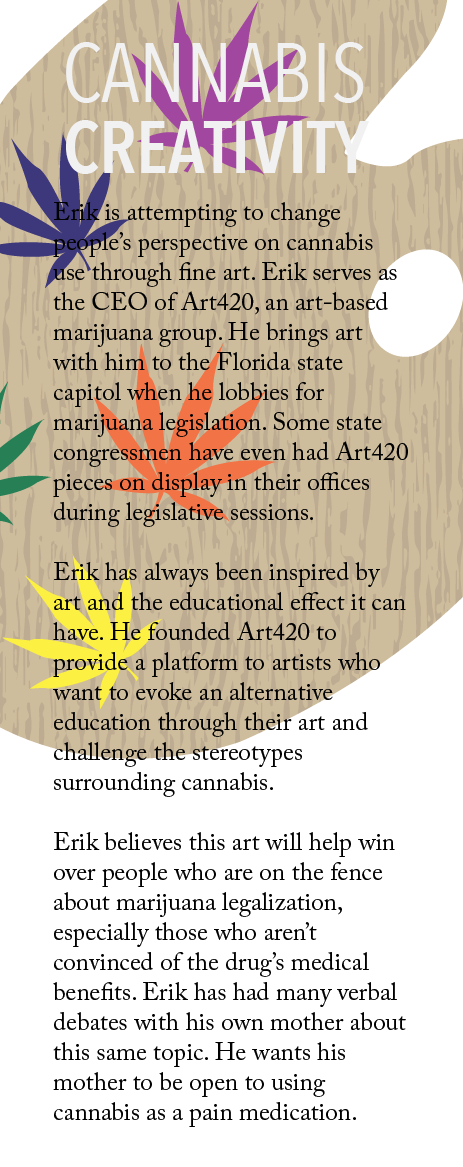Minorities in the legal cannabis industry are attempting to surpass legal and societal barriers to promote diversity and representation in their line of work.
Four years ago, Khadijah Adams sent a mass text to everyone in her contacts to say that she was selling anything she couldn’t fit in her car. She would be leaving her home in Sugar Land, Texas, to pursue the opportunity of a lifetime—a decision that left her family and friends confused.
Everyone she knew began asking why she was leaving and risking everything she had. I don’t give a damn, she told them. It’s a plant God created.
The year was 2014. Recreational marijuana had recently been legalized in Colorado and Washington. Khadijah, an African-American woman who’d been working as a career entrepreneur for more than 20 years, packed everything she needed in her car and drove 1,000 miles from Texas to Aurora, Colorado, to see what she could make of herself in this new land.
Since Khadijah first decided to enter the marijuana business, the industry has seen substantial growth. Several states and Washington, D.C., have legalized cannabis for recreational use, and most states have legalized it for medicinal use. But the drug is still federally illegal, and the federal government has been reluctant to view the industry as legitimate. The Centers for Disease Control and Prevention, for example, has published several reports outlining the possible dangers of marijuana use.
Khadijah, who says she has been using cannabis recreationally for 30 years, started using marijuana medically to alleviate the pain of her fibromyalgia in 2004. She says her doctor’s prescription medication she had been taking for her fibromyalgia damaged her liver, so she tried smoking more cannabis to naturally treat the pain.
The legal marijuana industry is one of the fastest-growing industries in the country, according to a ZipRecruiter report. However, factors such as disproportionate incarceration rates and other legal barriers keep minorities from playing significant roles in the legal cannabis industry compared to their white counterparts. Some minorities who already have a strong foothold in the cannabis industry, such as Khadijah, are working to promote diversity in the business and provide more opportunities for the underrepresented.
Khadijah has always looked for opportunities to invest her time and money, so when she began looking into the up-and-coming cannabis industry, she knew she had to be a part of it. She had access to enough capital from her previous business ventures to get a start in the industry. She noted that many minorities don’t have enough money to qualify for a marijuana license in several states. For example, in Nevada, a minimum of $250,000 is needed for a business to qualify for a marijuana license.
Despite her extensive business experience, Khadijah had no idea where or how she would fit in to this young, unpredictable industry, so she taught herself how to invest in marijuana stocks. She fell in love with the idea of buying, trading, and selling shares. Owning stocks allowed her to branch out into every corner of the industry, including lab technology, pharmaceuticals, sales, and glassware. The possibilities were limitless.
But when Khadijah learned about what she considered to be racial injustices in the cannabis industry, her whole perspective changed. She began to believe that politicians lie about the effects caused by marijuana, and that too many campaigns are based on the idea of prosecuting marijuana users. She realized she didn’t want to just make money in her new career, but she also wanted to help minorities make advancements in the industry.
This new-found perspective led Khadijah to become the vice president and chief operations officer of C.E. Hutton, the only minority-focused development firm in the legal cannabis industry. In her job, she helps clients prepare business and development plans, marketing strategies, and analytical reports.
C.E. Hutton, which is based in Denver, classifies minorities as women, people of color, veterans, and anyone in the LGBTQ community. The company works to help those people advance in the industry. Despite the firm’s focus, Khadijah says C.E. Hutton is an all-inclusive company that will provide help to anyone who seeks it.
Back when marijuana was illegal for recreational use in California, some people believed there was a double standard for whites who used cannabis in the state. Critics referenced a segment on the Today show that normalized marijuana use among moms in central California as a sparkling example of white privilege. These women, dubbed “marijuana moms,” said smoking cannabis helped them be better parents.
Chris Roberts, a staff writer for High Times magazine, wrote in a column for the magazine that a national news syndicate such as the Today show would never run a segment normalizing non-medical marijuana use if it involved people of color. Roberts referenced the death of Philando Castile, who was shot by a Minnesota police officer during a routine traffic stop, as an example of this double standard. The officer, who was later acquitted of charges of manslaughter, said he feared for his life because of the smell of marijuana in the car during the traffic stop. Minnesota Governor Mark Dayton says he believes Castile would still be alive had he been white.
“We’ve been the ones to be arrested time and time again,” says Erik Range, a board member for Minorities for Medical Marijuana. Erik says a significant fear stems from the War on Drugs that keeps minorities from entering the industry and discourages others from having anything to do with legal cannabis. Despite it being legal in certain states, some minorities still fear the federal government would arrest and prosecute them for participating in the cannabis businesses.
Minorities only occupy 17 percent of executive positions at cannabis businesses. Although that number is 4 percent higher than the national average among U.S. businesses as a whole, some hoped there would be more representation in a young industry that profits off a product that was historically used to put minorities behind bars.
Legislation Without Representation
Studies have shown positive health benefits among those who use marijuana for medicinal purposes. The medical marijuana industry has quickly become a multi-billion dollar business that provides patients with a product to help treat seizures, severe pain, arthritis, and cancer. Florida, where Erik is based, is one of 29 states where marijuana is legal for medical use.
During his lobbying efforts, Erik was able to co-author a diversity clause in one of the bills that require licensed medical marijuana businesses to provide a plan on how they will promote diversity in their businesses. Erik says diversity wasn’t even on the minds of lawmakers and wasn’t discussed at all when marijuana legislation was being passed before Erik and his partners came in contact with them.
Erik says they were pushing for a bill in the 2018 legislative session that would’ve made Florida the first state to allocate funds toward expunging records of people who were convicted for marijuana-related crimes, but the bill got shelved because legislation in response to the Parkland shooting took precedent. Erik and his team will lobby for the bill again in the next legislative session. They hope it will inspire other states to pass similar bills that would make it possible for more minorities with past convictions to enter the cannabis industry.
Even in states where cannabis is fully legal, some laws prevent past felons from having anything to do with the cannabis businesses, even if that felony charge had something to do with marijuana. One study led by a professor from the University of Georgia estimated that one out of every three black men have been charged with a felony. That’s 20 percent higher than the rate for all adult men.
Women also struggle to make significant advancements in the industry. When Khadijah first started, women occupied many vital positions in the marijuana business. But if a recent trend continues, she could become an exception.
Women occupied 36 percent of executive positions at cannabis businesses in 2015. That number has since dipped to just under 27 percent in 2017, close to 4 percent above the national average, according to a survey conducted by Marijuana Business Daily.
Legitimizing the Industry
The sale of marijuana by non-licensed cannabis dealers is still illegal in states where recreational marijuana is legal, and is a persistent problem for those states. One economic report prepared for the California Department of Agriculture estimated that legal marijuana production accounted for just 19 percent of all marijuana production in the state, meaning the vast majority of marijuana production is done illegally.
Erik says the entire effort to legalize marijuana use means “nothing” if it doesn’t help keep young people from selling illegal drugs on the streets.
The industry is currently in a “gray area” between federal prohibition and state legalization, so Erik says people involved in the industry need to work harder to normalize business practices, such as workplace safety. These “gaps” that Erik says people aren’t paying attention to could keep some of the industry’s biggest critics from recognizing it as legitimate.
Erik says the barriers set up by those critics keep them from having access to loans at a lot of banks in Florida, something that’s heightened especially for minorities seeking capital. Erik says Minorities for Medicinal Marijuana has engaged in conversations with these institutions to try to alleviate the stigma surrounding the industry.

Planting the Seeds for the Future
Aaron McCrary became the first black owner, operator, and cultivator of a cannabis business in Nevada after the state legalized marijuana for recreational use in 2017. When he goes to work at his Las Vegas-based business, Zion Gardens, Aaron does a daily plant assessment of his cannabis crops, making sure the plants’ health is up to par. These days, he spends a lot of time attending to the design of his warehouse, which he is in the process of expanding to help meet a high demand.
Aaron has been working with cannabis for more than 20 years, first working in Washington after the state legalized cannabis for medicinal use, but not recreational. Aaron, who graduated with a business degree from the University of Washington, learned about the cannabis product cycle and the inner workings of the industry while working in the state. He, like Khadijah with Colorado, saw an emerging market in Nevada and took advantage of the opportunity.
Aaron found his “niche” in trying to increase diversity in the industry. He makes that a top priority at Zion Gardens.
Aaron says Nevada is taking significant measures to prioritize diversity in cannabis legislation and regulations. The Nevada Independent reports that the state requests businesses seeking marijuana licenses to provide a report detailing the company’s diversity.
Aaron says the state has a history of regulating what were previously thought to be “taboo” industries, such as gambling and alcohol, and that federal lawmakers will once again eventually look to Nevada to help pioneer marijuana legislation.
C.E. Hutton is planning to publish a first-of-its-kind minority report this spring that will provide a digest on diversity in the cannabis industry. C.E. Hutton, with Khadijah at the helm, is looking to take all steps necessary to legitimize the marijuana industry and make it a place where minorities have serious opportunities to succeed and prosper.
Khadijah predicts significant growth in the already-booming legal cannabis industry within the next few years. She hopes the product will be made federally legal within the next two to five years.
“It’s coming,” Khadijah says. “When you see billionaires position themselves in a federally illegal industry, you gotta listen.”
Khadijah sees re-educating communities about cannabis and the growing number of young political activists as key to marijuana becoming federally legal.
Erik, who lobbies in a Republican-dominated Florida government that he says resembles Indiana’s, says young people need to get involved in the Indiana legislative process if they want marijuana-friendly laws on the books.
“You have power in numbers,” Erik says, “and your voice is needed.”
Indiana, like 19 other states in America, does not allow any use of marijuana. Ohio, Michigan, and Illinois, as well as all other states in the northeastern U.S., have legalized marijuana for medical use.
Erik, who noted that lives were being lost while waiting for cannabis legalization, says they consider it a civil rights movement.
“Students have always been at the forefront,” Erik says, referencing the sit-ins led by college students from North Carolina. “Until you guys make us listen, we won’t. We as a country won’t do anything until our students act and say ‘Listen here, old folks, this isn’t right.’”





